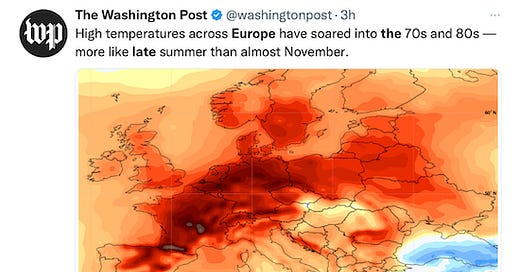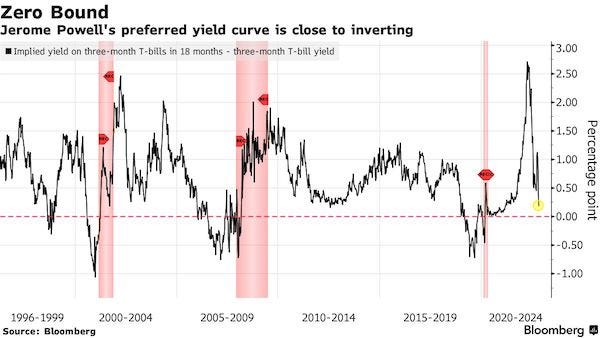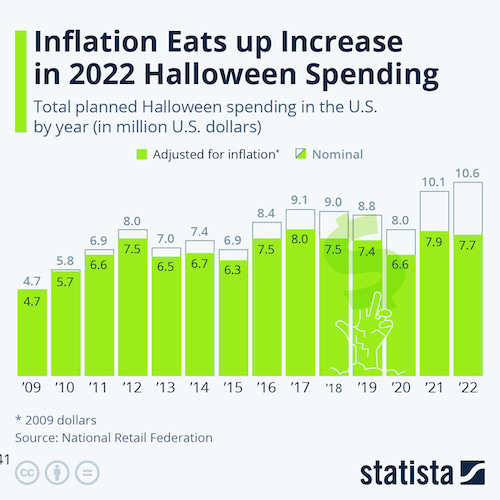Today’s posts that caught my eye:
U.S. workers have gotten way less productive. No one is sure why. Bosses and economists are troubled by the worst drop in U.S. worker output since 1947.
Norway puts military on raised alert level in response to Ukraine war.
Europe is seeing its warmest weather on record so late in the year: High temperatures have soared into the 70s and 80s — more like late summer than almost November.
Thank you for subscribing. Know someone who should check out the newsletter? Let them!
The World
U.S. workers have gotten way less productive. No one is sure why: Employers across the country are worried that workers are getting less done — and there’s evidence they’re right to be spooked. In the first half of 2022, productivity — the measure of how much output in goods and services an employee can produce in an hour — plunged by the sharpest rate on record going back to 1947, according to data from the Bureau of Labor Statistics. The productivity plunge is perplexing, because productivity took off to levels not seen in decades when the coronavirus forced an overnight switch to remote work, leading some economists to suggest that the pandemic might spark longer-term growth. It also raises new questions about the shift to hybrid schedules and remote work, as employees have made the case that flexibility helped them work more efficiently. And it comes at a time when “quiet quitting” — doing only what’s expected and no more — is resonating, especially with younger workers. (Washington Post)
President Jair Bolsonaro will not publicly address his defeat in Brazil's presidential election until Tuesday, a minister said, amid doubts over whether the far-right nationalist will accept the victory of his leftist rival Luiz Inacio Lula da Silva. Bolsonaro was holding off on making remarks so he could prepare a speech, Communications Minister Fabio Faria told Reuters. But it was not clear if Bolsonaro would concede defeat, as his allies were encouraging him to do. (Reuters)
Liz Truss's personal mobile phone was hacked by agents suspected of working for the Kremlin, The Mail on Sunday can reveal. The cyber-spies are believed to have gained access to top-secret exchanges with key international partners as well as private conversations with her leading political ally, Kwasi Kwarteng. One source said that the phone was so heavily compromised that it has now been placed in a locked safe inside a secure Government location. (The Daily Mail)
Norway is putting its military on a raised level of alert, moving more personnel on to operational duties and enhancing the role of a rapid mobilisation force in response to the war in Ukraine – although the prime minister said there was no reason to believe Russia intended to invade. “This is the most severe security situation in several decades,” Jonas Gahr Støre told a news conference on Monday. (The Guardian)
US president Joe Biden charged oil companies were “profiteering” from Russia’s invasion of Ukraine as he threatened them with legislation to impose a windfall tax unless they increase output. His comments come days after the oil and gas producers, including ExxonMobil and Chevron, reported enormous profits, and about a week before crucial midterm elections in which the price of petrol has put fellow Democrats on the defensive. Exxon, the biggest US oil company, reported record quarterly net profit of almost $20bn. Rival Chevron earned $11.2bn, just shy of record earnings the previous quarter. “Their profits are a windfall of war — a windfall from the brutal conflict that is ravaging Ukraine and hurting tens of millions of people around the globe,” Biden said. (Financial Times)
Iran’s judiciary has announced that it will hold public trials for as many as 1,000 people detained during recent protests in Tehran alone – and more than a thousand others outside the capital – as international concern grew over Iran’s response to the protests that began with the death of 22-year-old Mahsa Amini after her arrest. (The Guardian)
On Tuesday, 6,788,804 eligible Israeli voters have the opportunity to cast their ballots to elect Israel’s 25th Knesset. (Times of Israel)
It’s a tight race between Prime Minister Yair Lapid and opposition leader Benjamin Netanyahu. It is Israel's fifth election in less than four years and another attempt to break the political deadlock and return political stability to the country. It's also another opportunity for Netanyahu to try and win the 61-seat majority in the Knesset he needs to form a coalition that could pass laws and take steps to stop his corruption trial. State of play: The last polls before the elections, published on Friday night, showed a 60-60 tie between Netanyahu’s right-wing bloc and Lapid’s center-left bloc. (Axios)
Xi Jinping says China will build stable supply chain with ‘comrade’ Vietnam. Chinese president also notes ‘complex international environment’ facing the two socialist countries in talks with Nguyen Phu Trong. Visiting Vietnamese Communist Party chief says the nation will not allow any foreign military base to be established there. (South China Morning Post)
The U.S. and South Korea began one of their largest combined military air drills, with hundreds of warplanes from both sides staging mock attacks 24 hours a day for the better part of a week. The operation, called Vigilant Storm, will run until Friday, and will feature about 240 warplanes conducting about 1,600 sorties, the U.S. Air Force said in a statement last week. That number of missions is the highest ever for this annual event, it added. (Reuters)
North Korea demands the U.S., South Korea halt joint military drills. (Reuters)
The Supreme Court appeared ready to rule that the race-conscious admissions programs at Harvard and the University of North Carolina were unlawful, based on questioning over five hours of vigorous and sometimes testy arguments, a move that would overrule decades of precedents. Such a decision would jeopardize affirmative action at colleges and universities around the nation, particularly elite institutions, decreasing the representation of Black and Latino students and bolstering the number of white and Asian ones. (New York Times)
As a Skeptical Supreme Court Weighs Race in College Admissions, 'Brown' Looms Large. (Education Week)
Conservative justices seem to like precedent this time around: Barrett and Kavanaugh focused Monday on applying precedent, not overturning it, arguing that Justice Sandra Day O’Connor’s unusual call two decades ago in Grutter for educational affirmative action to phase out in 25 years should be respected. (Politico)
Europe is seeing its warmest weather on record so late in the year: High temperatures have soared into the 70s and 80s — more like late summer than almost November. (Washington Post)
California set a record for greenhouse gas reductions in 2020, but it means nothing. The amount of planet-warming gases Californians released into the atmosphere in 2020 was 9% less than the previous year. But the quantity of carbon dioxide spewed by record-setting wildfires that same year effectively erased almost two decades of emission reductions. (Los Angeles Times)
Economy
The Federal Reserve’s fifth-straight outsized rate hike may spur fresh warnings that a recession is inevitable, based on a bond-market signal preferred by Chair Jerome Powell himself. Powell’s favored yield curve -- where three-month rates are now versus where they are expected to be in 18 months’ time -- is on the cusp of inverting, with the spread between the two tumbling to a mere 0.2% Tuesday from 2.7% in April. An inverted yield curve is a key warning sign for many investors that a recession is coming and many closely-watched spreads in the Treasury market have already flipped below zero. (Bloomberg)
The OECD’s departing tax chief, who masterminded the most radical reforms to corporate taxation for almost a century, has warned that the US and Europe risk reviving trade wars and face hundreds of billions of dollars in lost revenue if they fail to implement last year’s global deal. Some 136 countries have backed a two-pronged deal that aims to address public outrage over multinationals not paying their fair share of tax. But progress on both pillars of the reforms has stalled, despite OECD calculations that show governments could collect more than $150bn in additional taxes annually from the world’s largest corporates. (Financial Times)
Asia's factory output weakened in October as global recession fears and China's zero-COVID policy hurt demand, business surveys showed on Tuesday, adding to persistent supply disruptions and darkening recovery prospects. Further U.S. interest rate hikes are also expected to force most Asian central banks to prevent sharp capital outflows by tightening their own monetary policies, even if it means cooling already soft economies, analysts say. (Reuters)
South Korea Oct exports post worst fall in 26 months, deficit widens. (Reuters)
Japan’s near total dependence on imported energy means it cannot “survive” without continuing to buy oil and gas from Russia, said the head of one of the country’s big five trading houses. In an interview with the Financial Times, Masahiro Okafuji, chief executive of Itochu, whose largest shareholder is Warren Buffett, said the country’s continuing use of Russian energy after the invasion of Ukraine would hinge on support from the US and Europe for Japan’s position. (Financial Times)
Japan rolled out a $200 billion economic aid package to buoy the yen as it slipped to historic lows against the dollar and consumers struggle with the sharpest rate of inflation since 1982. (Nikkei Asia)
With nothing to sell, Vietnam gas stations start to close: Deliveries fail to arrive, disrupting life in a nation that relies on motorbikes. (Nikkei Asia Review)
Annual inflation in countries that use the euro reached a record high of 10.7%, driven by surging food and energy prices, and gross domestic product rose an anemic 0.2% between July and September, which economists worry will lead to recession. (Associated Press)
Technology
Washington’s restrictions on US citizens assisting China’s chip industry will be more narrowly enforced than feared, suggesting a smaller-than-expected impact on semiconductor companies doing business in the world’s second largest economy. The rules seem to be mostly targeting US persons working in certain functions for semiconductor manufacturing equipment firms, based on a document the Bureau of Industry and Security published last Friday to clarify export control measures announced on Oct. 7. (Bloomberg)
Some of Meta’s biggest shareholders have lined up to vent their anger at the social media company’s management after it stunned Wall Street with plans to ramp up its lossmaking effort to build the metaverse. “Zuckerberg was tone-deaf to the investment community, doubling down on everything,” said David Older, head of equities at €33.2bn asset manager Carmignac, which has holdings in Amazon, Microsoft and Google but not Meta. “The timeline for the metaverse is very stretched. I don’t think you’re going to know if it is the right move for five or 10 years.” (Financial Times)
Debunking five myths that may be sinking Meta's stock, including claims of Facebook users deserting, Instagram engagement falling, and TikTok dominating. (Stratechery)
Let’s talk about those blue check marks. How much money could charging users for verification actually help Twitter’s top line? Some rough math suggests it could lift revenue by more than 20%. In total, that math gets you added annual revenue of about $1.1 billion, which represents a 21% increase from the $5.3 billion Twitter posted in sales over the past twelve months. In other words, people can whine all they want about not wanting to pay for a blue check, but the data bear out that such an arrangement could actually be a significant financial opportunity, especially when you consider that Twitter’s revenue shrank 1% in the most recent quarter compared to the same period last year. (The Information)
Elon Musk has instructed Twitter engineers to work on a Vine reboot that could be ready by year end. Twitter shuttered the looping-video app in 2016 after acquiring it four years earlier, leaving loyal Vine fans dismayed. Twitter engineers already have been assigned to look at Vine's old code base, which hasn't been changed or updated since the shutdown. (Axios)
Elon Musk has pulled more than 50 of his trusted Tesla employees, mostly software engineers from the Autopilot team, to help at Twitter. (CNBC)
Elon Musk, who runs four other companies, will now be Twitter CEO. (Reuters)
Jack Dorsey rolls his stake into Elon Musk-owned Twitter. (Financial Times)
Smart Links
Cholera overwhelms Haiti as cases, deaths spike amid crisis. (Associated Press)
Why Does the U.S. Always Seem to Get Coronavirus Variants After Europe Does? (Slate)
Judge blocks Penguin Random House and Simon & Schuster $2.2bn megamerger. (Financial Times)
Credit Suisse plans to push ahead with China expansion after overhaul. (Reuters)
Taylor Swift becomes first musician to claim entire Top 10 on Billboard Hot 100. (The Guardian)
Inflation Eats up Increase in 2022 Halloween Spending. (Statista)
Good News
Tech titans rival one another in Halloween decor: The wonders of competition in Silicon Valley. Steve Jobs started it. In the 1990s, when Apple’s co-founder had young children, come October the front garden of his rambling English cottage in a leafy Palo Alto neighbourhood sprouted gruesome decor—not just skeletons and pumpkins but sound effects and special lighting—leading to a cauldron overflowing with dry ice at the front door. Jobs himself could be spotted handing out (now defunct) Odwalla health bars, an annual disappointment for trick-or-treaters who heard rumours of free iPods. The family later upgraded to goody-bags that included Toblerone. (The Economist)


It couldn’t be Halloween without Vincent Price:

Thank you for subscribing to my newsletter. Know someone you think would like it?





